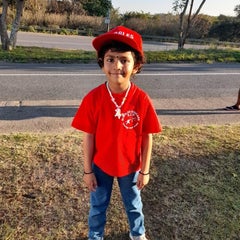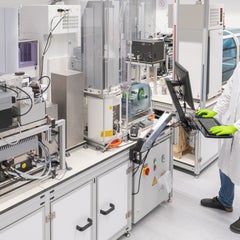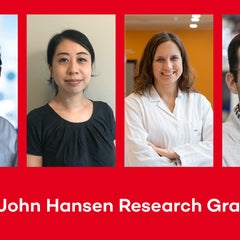South African blood cancer patients to receive life-saving treatment through DKMS and Be the Match partnership
Western Cape, February 15, 2022 – Today, DKMS and Be The Match, USA, launched their joint pilot program for young patients from South Africa suffering from blood cancer and life-threatening blood disorders such as severe aplastic anemia.
Western Cape, February 15, 2022 – Today, DKMS and Be The Match, USA, launched their joint pilot program for young patients from South Africa suffering from blood cancer and life-threatening blood disorders such as severe aplastic anemia. With “DKMS State Patient Support, in Partnership with Be the Match” the two non-profit organisations will enable eight state patients aged between 0 and 18 years in need of a blood stem cell transplant from an unrelated volunteer donor to receive life-saving treatment.
Every 5 minutes someone in South Africa is diagnosed with blood cancer or an inherited blood disorder. For many patients a blood stem cell transplant is the only chance of survival. Only one third of patients find a matching donor in their own family, the majority therefore depend on an unrelated donor, a genetic twin whose relevant tissue characteristics (HLA) match those of the patient as closely as possible.
While South Africa’s public healthcare system fully covers the cost for the blood stem cell transplantation for patients who have found a matching donor within their family, patients who rely on a stranger to donate their cells are faced with two major challenges in their journey to transplantation: A matching donor has to be found and they need to pay for the donor-related costs. These include the search for the best possible match for which the patient needs to be tissue typed, the verification of the donor which entails further tests, the collection of the blood stem cells and their safe transport to the patient. DKMS and Be The Match will bridge this gap for patients without medical aid who cannot afford the donor-related costs that are not covered by the public health care system to provide them with a second chance at life.
“As an international organisation committed to the fight against blood cancer we have expanded our mission to improve the access to transplantation for patients in low- and middle-income countries. In South Africa, costs are a main barrier for patients in need of an unrelated donor. No family should worry about not being able to afford life-saving treatment for their child,” says Dr. Elke Neujahr, Global Chief Executive Officer at DKMS. “Partnering with Be The Match on this program we can alleviate this financial burden for state patients. By working together, we can help more families and give parents hope that their children will have a healthy future. Collaboration is vitally important in this respect.”
"Be The Match is committed to our global vision of equal outcomes for all. When a blood stem cell transplant from an unrelated donor may be the best, or only, hope of a cure, it's partnerships like these that bring donors and patients together to save lives," adds Amy Ronneberg, Be The Match's Chief Executive Officer. "We're delighted to continue to partner in South Africa to help further meet the needs of searching patients."
Participating state transplant centers
Blood stem cell transplantation is a complex procedure that requires specialised care. There is both capacity and skill available in South Africa’s state transplant centers. Patients who will be transplanted under the program will be treated by experienced pediatric oncologists in two modern clinics, the Steve Biko Hospital, in Pretoria (Prof. D. Reynders) and the UCT, Red Cross War Memorial Children’s Hospital, in Cape Town (Prof. A. Davidson).
“We are pleased to work with DKMS and Be The Match on this exciting initiative. In many instances, the only hope that a blood disorder or blood cancer patient has is a blood stem cell transplant. We believe that efforts to expand access to bone marrow transplantation to more South African children need to be prioritised,” says pediatric Oncologist at Red Cross War Memorial Children’s Hospital, Prof Alan Davidson.
"South Africa is home to over 60 million people, and the burden of disease is no different to the rest of the world. Based on these numbers, at least 250 pediatric blood stem cell transplants should be performed each year, although sadly, less than 30 transplants are done annually in children. One of the major reasons for this is the current strain on the public healthcare sector and lack of funding and support for the search and treatment using unrelated donors. DKMS and Be The Match have started an initiative that will fund the transplants of eight children in 2022 thereby giving them a second chance at life, who may otherwise not have had this option available to them. We would like to thank DKMS and Be The Match for this much-needed project,” says Professor David Reynders, Head of Clinical Unit Pediatric Oncology at the Steve Biko Academic Hospital.
DKMS and Be The Match are starting the program in South Africa as a pilot with the hope of expanding it soon. While many patients depend on a stem cell donation from an unrelated donor, the search for a genetic twin is like finding a needle in a haystack. Donors of South African origin have unique tissue (HLA) characteristics that are severely under-represented in the global database. In this respect, South Africa’s rainbow nation is at a distinct disadvantage, requiring a large pool of prospective donors. Thus, it is also necessary to register as many potential blood stem cell donors as possible to increase the likelihood of finding the perfect match for South African patients.
DKMS support programs
“If we want to prevent families from suffering the loss of a loved one, we need to help, where help is needed! For the second chance at life, we cross borders, collaborate globally and leave no stone unturned to help patients. Every patient with blood cancer or a life-threatening blood disease deserves that chance. Thus, we have established several support programs to increase the access to transplantation and to significantly improve the situation of patients, particularly those living in low- and middle-income countries,” highlights Dr. Elke Neujahr.
For more information about the DKMS support programs for low- and middle-income countries, please visit https://professional.dkms.org/services/support-programs/access-to-transplantation.




